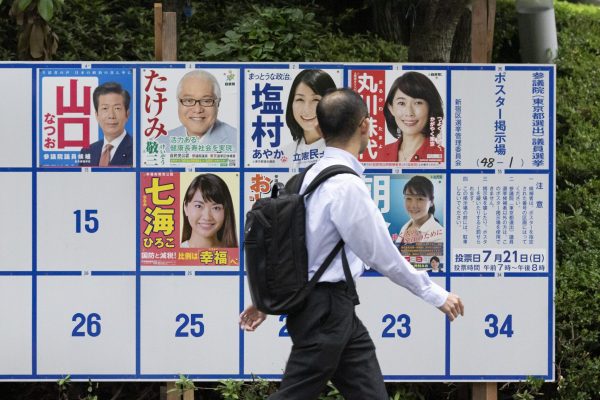At first glance, an imminent consumption tax increase, revelations that future pension payouts will not cover the costs of retirement, low confidence in the economy, and high-level uncertainties surrounding the US–Japan alliance point to a 2007-like result. The opposition’s message should be simple and attractive — punish the ruling parties and give the opposition greater power to hold the government accountable. But neither the Abe administration nor the Liberal Democratic Party (LDP) appear worried about incurring public wrath.
The tax increase remains unpopular, but many also accept its inevitability. While surely queasy every time he hears the words ‘pension controversy’, Prime Minister Abe himself is not being directly blamed for the 20 million yen (US$184,000) per person gap between estimated payouts and necessary income for a 30-year retirement. Although the LDP took a short-term hit in popularity, there is a general acceptance that individuals — not the government or new taxes — should make up the shortfall brought about by still increasing Japanese life expectancy.
And if any other US president while visiting Japan had criticised the US–Japan alliance as unfair and demanded change while soft-pedalling the North Korea threat in the same speech, public and official reaction would have been quite different to what transpired after the Osaka G20. But subsequent coverage of US President Donald Trump’s comments focussed on Japanese officials brushing off the issue. Despite the awkwardness, Abe’s close and at times obsequious diplomacy towards Trump isn’t harming him domestically. The Trump-related challenges that could hurt Abe lie beyond the election: a bad North Korea deal, trade talks, and negotiations over host nation support.
The Abe administration therefore retains robust levels of support ahead of the Upper House election, where 124 out of 245 total seats will be contested. Indicators suggest that it will be another low-turnout affair — traditionally an advantage for the LDP as sceptical centrists stay at home. The LDP has also co-opted prominent former Democratic Party centrists with strong name recognition like Akihisa Nagashima and Goshi Hosono to campaign on its behalf around the country.
By doubling down on a core message of political stability, Abe and the LDP–Komeito ruling coalition should win their sixth consecutive national election, retain majorities in both Diet houses, and avoid a repeat of 2007.
The more burning question is whether the pro-revision parties can retain or extend the two-thirds supermajority they have in the Upper House — the key to initiating a constitutional referendum. Komeito will likely maintain its Diet strength. The Japan Innovation Party (Nippon Ishin) will likely remain strong due to the timely success of the Osaka Restoration Party (Osaka Ishin) in progressing local merger plans within the greater Osaka area.
Things are less clear for the LDP. The last time this year’s seats were contested was in 2013 when Abe enjoyed levels of public support since unmatched. With the centre-left reeling from electoral disaster, fragmented, and with no coherent electoral strategy, the LDP alone won 65 out of 121 seats, including a record-breaking 29 of 31 critical single-member districts that time round.
But the Abe administration’s current public support is closer to 2016 levels, when the LDP won a more modest 56 out of 121 seats, including 21 of 32 single-member districts. Also unlike 2013, the main centre-left Constitutional Democratic Party has a much more skilled leader and campaigner in Yukio Edano, and the broader left-leaning opposition secured agreement on running only one candidate in each single-member district. With 67 LDP seats on the line this election, the LDP will struggle just to not lose seats, unlike 2016 when it went in with 50 seats.
There are other wild cards that may also undercut a constitutional supermajority.
While the public wants to see the ruling LDP–Komeito coalition maintain its majority in the Upper House, according to NHK polling only 21 per cent of the public actually wants to see the ruling parties increase their Diet strength, with more (29 per cent) wanting to see a stronger opposition. The prospect of a too-lopsided victory may therefore result in pull-back and last-minute vote splitting.
Komeito’s now six-year long association with the Abe administration is also grating on some sections of its usually reliable but ostensibly pacifist Soka Gakkai voting bloc and even Komeito members. Denny Tamaki benefitted from a larger than expected degree of Soka Gakkai/Komeito voter support during the recent Okinawa governor election, contributing to the government-backed candidate’s losing.
Even a small drop off in Soka Gakkai support for LDP candidates might be decisive in tight single-member district races. For example, in Akita an LDP incumbent is running on a small majority, but recent controversy over the installation of an Aegis Ashore missile defence system bears similarities to the American base issue in Okinawa.
Still, these factors will only affect the size of the ruling coalition victory. Ultimately, with major international events such as the 2019 Rugby World Cup and 2020 Tokyo Olympics coming up, the Japanese electorate has little appetite to risk political instability.
Corey Wallace is Einstein Postdoctoral Fellow at the Graduate School of East Asian Studies, the Free University of Berlin.


“follow majority blindly” “follow dominant atmosphere blindly”
those are historically typical nature of the Japanese unfortunately.